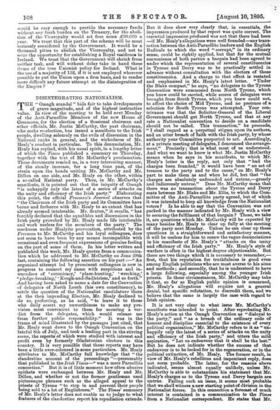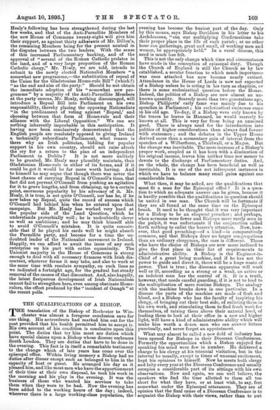DISINTEGRATING NATIONALISM.
THE "Omagh scandal" bids fair to take developments of grave magnitude, and of the highest instructive value. In view of the meeting to be held next Monday of the Anti-Parnellite Members of the new House of Commons, for the election of a Sessional chairman and other officials, Mr. Justin McCarthy, the past chairman, who seeks re-election, has issued a manifesto to the Irish people, dwelling solemnly on the evils of dissension in the National ranks in general, and the wickedness of Mr. Healy's conduct in particular. To this denunciation, Mr. Healy has replied, with his usual spirit, in a lengthy letter of which the Times published a summary on Thursday, together with the text of Mr. McCarthy's proclamation. These documents remind us, in a very interesting manner, of the steady increase, for a long time past, of the strain upon the bonds uniting Mr. McCarthy and Mr. Dillon on one side, and Mr. Healy on the other, within a so-called National party. Thus, in Mr. McCarthy's manifesto, it is pointed out that the iniquity of Omagh "is unhappily only the latest of a series of attacks on the unity and efficiency of the Irish party." Elaborating this point, the official Freeman's Journal observes that "the Chairman of the Irish party and its Committee have borne and forborne with Mr. Healy to an extent that has already seemed intolerable. Mr. Sexton," it recalls, "has forcibly declared that the squabbles and dissensions in the Irish party provoked by Mr. Healy made life intolerable and work useless for the members of the party." The meekness under Healyite provocation, attributed by the Freeman to Mr. McCarthy and his loyal colleagues, does not seem to have been by any means incompatible with occasional and even frequent expressions of genuine feeling on the part of some of them. In his letter written and published this week, Mr. Healy quotes from a communica- tion which he addressed to Mr. McCarthy on June 29th last, containing the following assertion on his part :—"An organised attempt led by prominent colleagues is now in progress to connect my name with suspicions and in- nuendoes of ' con spiracy," place-hunting," wrecking,' 4 pledge-breaking," Keogh-and-Sadleirism,' and so forth." And having been asked to name a date for the Convention 'of delegates of North Louth (his own constituency), to settle the question of the Nationalist candidature there at the then impending Election, Mr. Healy declined to -do so, preferring, as he said, "to leave it to those who daily assert my unworthiness to make any pro- vision most convenient to them for securing a ver- -diet from the delegates, which would release me -from further public responsibility." It was in the frame of mind illustrated by the passages just cited, that Mr. Healy went down to the Omagh Convention on the fateful 8th of July, and took a leading part in the stirring scene, the reports of which were studied with interest and profit even by formerly Gladstonian electors in this .country. It is very possible that those reports may have been a little over-coloured in some particulars. Mr. Healy attributes to Mr. McCarthy full knowledge that "the clandestine account of the proceedings "—presumably that published in the Irish Times—" was a mere Parnellite concoction." But it is of little moment how often abusive epithets were exchanged between Mr. Healy and Mr. Dillon, and whether or not the former gentleman used picturesque phrases such as the alleged appeal to the priests of Tyrone "to step in and prevent their people being sold to a lot of Englishmen." The Times' summary of Mr. Healy's letter does not enable us to judge to what features of the clandestine report his repudiation extends. But it does show very clearly that, in essentials, the impression produced by that report was quite correct. The essential impression produced was not that there had been —if Mr. Healy's allegations were well founded—any trans- action between the Anti-Parnellite leaders and the English Radicals to which the word "corrupt," in its ordinary sense, could be rightly applied, but that for the mutual convenience of both parties a bargain had been agreed to under which the representation of several constituencies in Tyrone and Derry was to be practically settled in advance without consultation with the electors of those constituencies. And a charge to that effect is restated and emphasised in Mr. Healy's latest letter. "Under the Blake compact," he says, "no delegates to the Tyrone Convention were summoned from North Tyrone, which you knew could be carried, while scores of delegates were brought from South Tyrone, which you knew could not, to affect the choice of Mid Tyrone, and no pretence of a selection for South Tyrone was attempted. Your con- trivance was that the Solicitor-General of the Liberal Government should get North Tyrone, and that at any rate a Nationalist convention to decide on a candidate should not be called. This transaction," he proceeds, "I shall regard as a perpetual stigma upon its authors, and an utter breach of faith with the Irish party, by whose authority your Committee purported to act. Accordingly, at a private meeting of delegates, I denounced the arrange- ment." Precisely ; that is what most of us understood. And what we want to know is what Mr. Justin McCarthy means when he says in his manifesto, to which Mr. Healy's letter is the reply, not only that "had the charges been founded," it would have been "an act of treason to the party and to the cause," on Mr. Healy's part to make them as and when he did, but that "the charges are absolutely unfounded and untrue,—grossly and ludicrously untrue." Does Mr. McCarthy mean that there was no transaction about the Tyrone and Derry seats between Mr. Blake and Mr. Ellis, to which the Com- mittee of the Anti-Parnellite party agreed, but of which it was intended to keep all knowledge from the Nationalist voters ? Is he able to say that the Convention was not packed in the manner indicated by Mr. Healy with a view to securing the fulfilment of that bargain ? These, we take it, are questions which Mr. McCarthy will be expected by many besides Mr. Healy to clear up fully at the meeting of the party next Monday. Unless he can clear up these questions in a straightforward and satisfactory manner, it will be useless for him to renew the vague denunciations in his manifesto of Mr. Healy's "attacks on the unity and efficiency of the Irish party." Mr. Healy's style of warfare is often in the highest degree objectionable. But there are two things which it is necessary to remember,— first, that his reputation for truthfulness is good even among English politicians who are most averse to his aims and methods ; and secondly, that he is understood to have a large following, especially among the younger Irish priests. In these circumstances, Mr. McCarthy may take it that, so far as English public opinion is concerned, Mr. Healy's allegations will require not a general denial, but specific refutation, to discredit them, and we believe that the same is largely the case with regard to Irish opinion.
It is not very clear to what /Me Mr. McCarthy's manifesto was intended to point. After reprobating Mr. Healy's action at the Omagh Convention as "disloyal to the party," and "as a breach of the ordinary code of honour and discipline essential to the existence of every political organisation," Mr. McCarthy refers to it as "un- happily only the latest of a series of attacks on the unity and efficiency of the Irish party," and utters the mild aspiration "Let us endeavour that it shall be the last." But he does not indicate whether the success of that endeavour is to be looked for in the regeneration, or in the political extinction, of Mr. Healy. The former result, in view of Mr. Healy's rebellious and impenitent reply, does not seem probable. The latter, for the reasons above indicated, seems almost equally unlikely, unless Mr. McCarthy is able to substantiate his statement that Mr. Healy's charges as to the Tyrone and Derry bargain are untrue. Failing such an issue, it seems most probable that we shall witness anew starting point of division in the Nationalist forces. In this connection a forecast of much interest is contained in a communication to the Times from a Nationalist correspondent. He states that Mr. Healy's following has been strengthened during the last few weeks, and. that of the Anti-Parnellite Members of the new House of Commons twenty-eight will give him their support, as against thirty adherents of Mr. Dillon'e, the remaining Members being for the present neutral in the disputes between the two leaders. With the sense of this increased Parliamentary backing, and of the approval of "several of the Roman Catholic prelates in the land, and of a very large proportion of the Roman Catholic clergy," Mr. Healy, we are told, intends to submit to the newly elected Nationalist Members "a somewhat new programme,—the substitution of repeal of the Union for the Gladstonian Home-rule Bill" (which?) "as the end and aim of the party." Should he not obtain the immediate adoption of his "somewhat new pro- gramme" by a majority of the Anti-Parnellite Members at the party caucus, Mr. Healy, nothing discouraged, will introduce a Repeal Bill into Parliament on his own responsibility, thereby placing the opposing Nationalists "in the predicament of voting against Repeal,' and choosing between that form of Home-rule and their alliance with the Liberal Opposition." We can see nothing inherently improbable in this anticipation. It having now been conclusively demonstrated that the English people are resolutely opposed to giving Ireland a technically subordinate Parliament, what reason is there why an Irish politician, bidding for popular support in his own country, should not raise afresh the cry for a return to the plan of an independent Parliament in Dublin ? It is not more unlikely to be granted, Mr. Healy may plausibly maintain, than Glad stonian Home-rule in either of its forms, and if it could be got it would be far more worth having. And to himself he may argue that though there was never the least chance of carrying Repeal in O'Connell's time, that fact did not prevent O'Connell from pushing an agitation for it to grave lengths, and from obtaining, up to a certain point, enormous popularity by his advocacy of it. Mr. Healy, it is true, is not quite O'Connell, nor has he, if he now takes up Repeal, quite the record of success which O'Connell had behind him when he entered upon that campaign. But Mr. Healy has worked very hard at the popular side of the Land Question, which he understands proverbially well ; he is undoubtedly clever as well as ambitious ; and he may think himself able to avoid O'Connell's mistakes. It is quite conceiv- able that if he played his cards well he might absorb the Parnellite party, and become for a time the un- doubted leader of the Nationalist movement in Ireland.. Happily, we can afford to await the issue of any such enterprise on his part with entire equanimity. The Unionist majority in the House of Commons is strong enough to deal with all necessary firmness with Irish dis- content, whatever forms it may take, and also to work at the same time with resolute sympathy, on such lines as we indicated a fortnight ago, for the gradual but steady removal of the causes of that discontent. And, also happily, the latest fissiparous development of Irish Nationalism cannot fail to strengthen here, even among obstinate Home- rulers, the effect produced by the " incident of Omagh" at the recent polls.



































 Previous page
Previous page